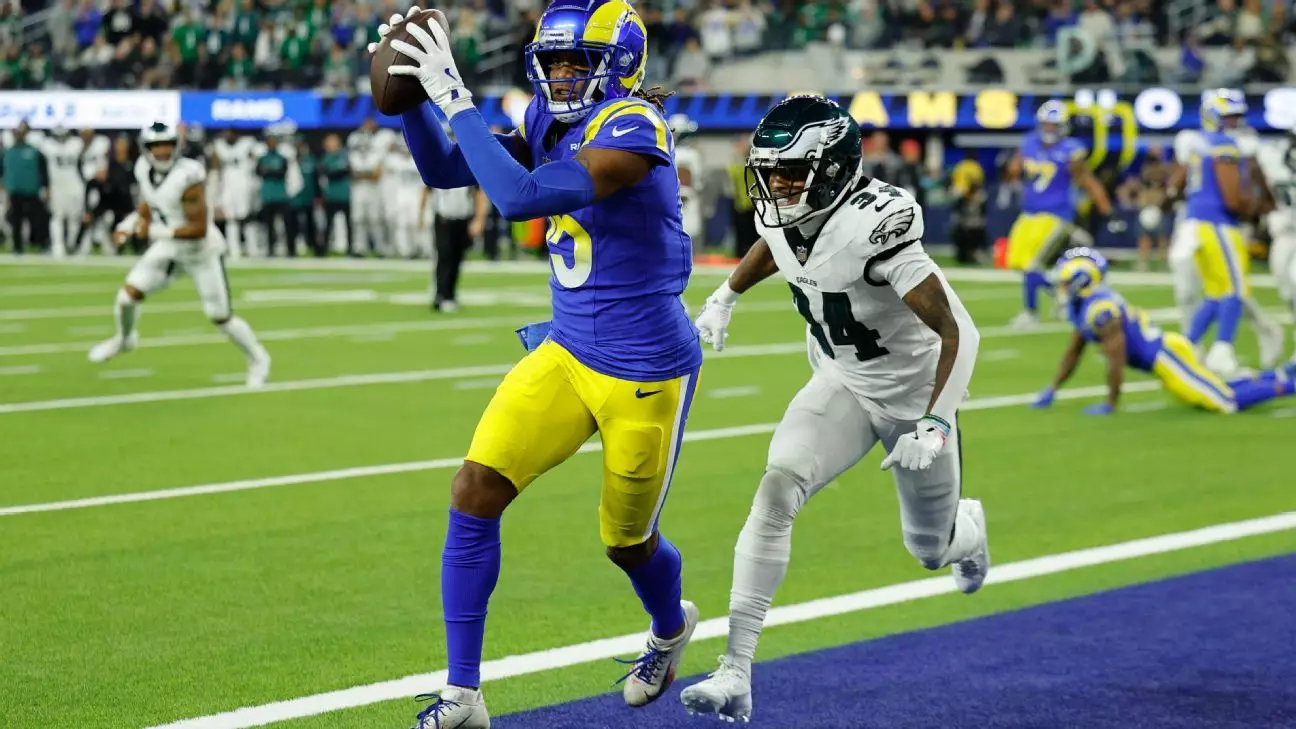On Monday morning, wide receiver Demarcus Robinson of the Los Angeles Rams found himself in legal trouble after being arrested on suspicion of driving under the influence (DUI). Around 5:13 a.m., law enforcement apprehended Robinson while he was speeding—clocked at over 100 mph on U.S. 101 in Woodland Hills, California. This shocking event transpired just hours after he contributed to the Rams’ performance the previous night by scoring a touchdown, albeit during a disappointing loss against the Philadelphia Eagles. Such contrasting circumstances create a narrative that showcases the unpredictable nature of professional sports, where moments of triumph can quickly spiral into crises.
In the face of this situation, Coach Sean McVay announced that Robinson would not face any immediate suspension for the upcoming game against the New Orleans Saints. Instead, McVay emphasized the team’s intention to allow the legal process to unfold. This decision serves multiple purposes: it acknowledges the importance of due process while also leaving room for Robinson to remain engaged with his teammates on the field. The choice indicates McVay’s belief that the incidents surrounding Robinson’s arrest could be turned into a teaching moment for the entire team, fostering a culture of accountability and responsibility.
Robinson’s Own Words: Acknowledgment of Mistakes
After practice on Wednesday, Robinson spoke candidly about the process that led to his arrest. He expressed that he had yet to hear from the NFL regarding any potential disciplinary measures, and he had no clear indication of when the legal proceedings would commence. His open approach reflects a level of transparency that is often missing in professional sports scandals. He acknowledged the recklessness of his behavior and emphasized his desire not to be a source of negativity for the Rams, showcasing a sense of accountability that resonates beyond the field.
“I sincerely apologize to him and the team and this whole organization for even putting myself and the organization in a predicament like that,” Robinson stated. His reflections highlight an understanding that professional athletes are not just representatives of their teams but also role models within their communities. The implication here is profound: athletes must navigate their personal lives with the awareness that their actions have repercussions that extend beyond their immediate surroundings.
Coaching Perspective: A Lesson for the Team
Coach McVay shared insights from his conversation with Robinson, indicating that he finds value in the player’s willingness to address his mistake openly in a team meeting. McVay’s remarks underscore a pivotal role that such incidents can serve within a team context. Instead of casting Robinson as merely a scapegoat for negative behavior, McVay sees the opportunity for growth. “I do think this is something that with the words that he said, our guys will learn from it, and hopefully nobody’s ever going to repeat something like this,” he mentioned, conveying a key message about learning from one’s errors rather than shying away from them.
The moment of introspection shared between McVay and Robinson signals a collective commitment to learning and growth, rather than punishment and blame. This sentiment fosters a more supportive environment within the locker room, where individuals are encouraged to own their mistakes and understand their implications.
Robinson’s narrative serves as a critical reminder of the responsibilities that athletes bear as public figures. The dynamics of performance, personal behavior, and team identity become inextricably linked in the world of sports. His experience illustrates the potential for personal growth and team unity in the face of adversity. As he embarks on the journey of confronting his choices, his teammates—who witness the repercussions of his actions—are given a chance to reflect upon their own choices and the values they uphold.
Ultimately, Robinson’s journey from error to understanding can transform into an invaluable life lesson, prompting self-reflection among his peers. In a season filled with highs and lows, such clarifying moments reinforce the notion that beyond the game, personal development stays paramount, reminding everyone that mistakes, while impactful, can pave the way for understanding and growth in the grand tapestry of life.


Leave a Reply